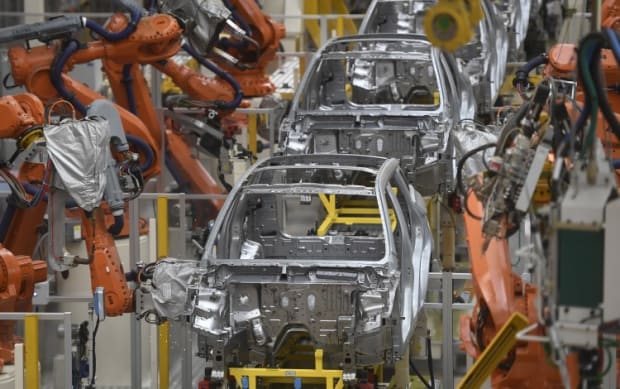As Russian troops pour into Ukraine, world leaders are retaliating by imposing targeted sanctions on Russia.
President Joe Biden is reportedly expected to announce a fresh set of sanctions on the region in a bid to curtail Russian power later on Thursday. The European Commission has also said more sanctions would follow.

Over the last few days, the U.S. has imposed sanctions on two major Russian banks and on the country’s sovereign debt, as well as several Russian elites and their family members.
Why Does It Matter?
The sanctions imposed by the U.S. and its allies have started impacting automakers with a significant presence in the Russian car market.
U.S.-listed shares of French car maker Renault, which has a large Russian subsidiary, fell over 5% on Thursday.
Renault had signaled about a "potential supply chain crisis for its plants in Russia" if the situation in Ukraine worsened, The Financial Times reported earlier this week.
Renault is looking to secure alternative supplies of electronic chips for its Avtovaz unit, Avtovaz Chief Executive Nicolas Maure said on Tuesday.
The French car maker's Russian business AvtoVaz could face problems securing components for its two factories in the country.
Renault's chief executive Luca de Meo said the company was “doing a study, just a preventive move” to assess where else it can source parts for the plants.
Meanwhile, SUV maker Stellantis is also reportedly ready to move or limit production if Western sanctions disrupt its Moscow operations.
Here's What May Happen Now
"If we cannot supply the plant, if that is the reality, we have either to transfer that production to other plants, or just limit ourselves,” Chief Executive Carlos Tavares told The Wall Street Journal.
Stellantis has a plant in Kaluga, 115 miles southeast of Moscow.
Russia’s decision to send troops into eastern Ukraine could also be a jolt for German auto maker Volkswagen.
Volkswagen told The Journal Thursday that its crisis team was monitoring the impact of the Russian invasion “continuously."
With an output of 225,000 units a year, Volkswagen's Kaluga facility is home to production of the Tiguan models, Volkswagen Polo and Skoda Rapid.
Volkswagen also assembles Audi Q7 and Q8 SUVs in this location.
The plant of Volkswagen Group Rus is located in the industrial park Grabtsevo in Kaluga, approximately 170 km southwest of Moscow.
While Mercedes-Benz Group, which invested more than $284 million (€250 million) in a factory to build its luxury E-Class sedans and SUVs, said it was in constant contact with the leadership of its manufacturing plant near Moscow, The Journal reported.
In 2019, Mercedes set up a factory an hour’s drive north of Moscow with production lines for its E-class models.
The Kaluga plant used to manufacture the Volkswagen Polo and Tiguan models as well as the Skoda Fabia and Octavia.
Russia No Longer An Emerging Growth Market
Russia was once considered Europe’s second-largest car market and a hub for investment from global brands.
"However, in recent years sluggish economic growth, unpredictable currency fluctuations and geopolitical headaches have weighed on profit margins for international carmakers," the Financial Times reported in 2019.
Top U.S. automakers Ford (F) and General Motors (GM) withdrew their Russian operations and shut down their factories in 2019 and 2015 respectively.
In August 2021, Russia set a target to produce 10% of electric vehicles out of all cars produced, by the end of 2030, with an investment of $8 billion.
Russia has said it aims to produce at least 25,000 electric vehicles by 2024.







